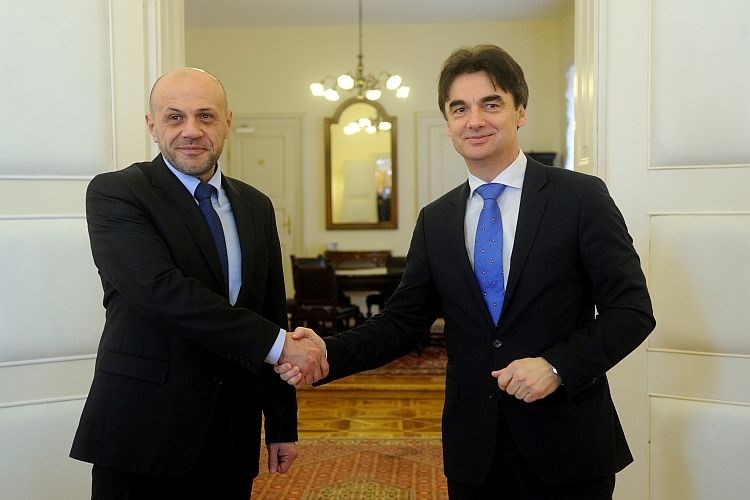- Published: 17.03.2015.
Croatian and Bulgarian ministers discuss cooperation and absorption of EU funds
Experience relating to the absorption of EU funds was the main topic of talks between Croatian Regional Development and EU Funds Minister Branko Grcic and Bulgaria's Deputy Prime Minister in charge of EU funds and economic policies, Tomislav Donchev, held in Zagreb on Tuesday.
"We have discussed some of our experiences related to the use of EU funds, as well as other tasks of our governments, notably adjustments under the Excessive Deficit Procedure," Grcic said after the meeting.
When using EU funds in the period from 2007 to 2013 Bulgaria was faced with all the problems that are usual at the beginning of that process, followed by stepped up activities and efforts to find constructive solutions in removing key obstacles to using EU funds. The general message is that the system needs to be improved and developed continually and that problems need to be identified and removed very quickly, said Grcic.
Croatia's advantage was that in the pre-accession period it had the Instrument for Pre-Accession Assistance, which it could use to practise, and that is why it is now ready for the absorption of structural investment funds which are eight to nine times higher than what it had before, said Grcic.
Donchev said that the talks focused on the absorption of EU funds, as well as on options regarding bilateral cooperation.
He underlined the importance of political cooperation in the representation of the two countries in EU institutions, as well as of economic cooperation.
Donchev went on to say that 72% of all public investments in Bulgaria were based on EU funds. Also, key reforms and programmes that are being implemented rely on EU funds, such as motorway construction, drinking water purifying plants and waste water processing plants, a subway in Sofia, a project to upgrade railways, and reforms in the public administration and social welfare systems.
Asked if they discussed funds for adjustment to standards of the Schengen passport-free area of movement, Grcic said they did not.
The Schengen regime is within the remit of the Ministry of the Interior, Grcic said, noting that around EUR 120 million in total was allocated for that purpose. At present, procurement and contracting procedures are under way for slightly more than EUR 90 million, he said, adding that the money would be used to the greatest possible extent and that he hoped other EU member countries would support Croatia's application to join the Schengen area within the set time frame.
Asked if Bulgaria possibly thought it would be unfair if Croatia joined the Schengen area before Bulgaria, considering that Bulgaria had been an EU member longer, Donchev said that technical criteria for accession to the Schengen area had been met but that the final decision was also a political one and that he could not say when it would be made.
He added, however, that countries should consider joining the programme due to the current turbulent developments and geopolitical risks and that he saw no reason why Bulgaria should not do it together with Croatia.
(Hina) rml
